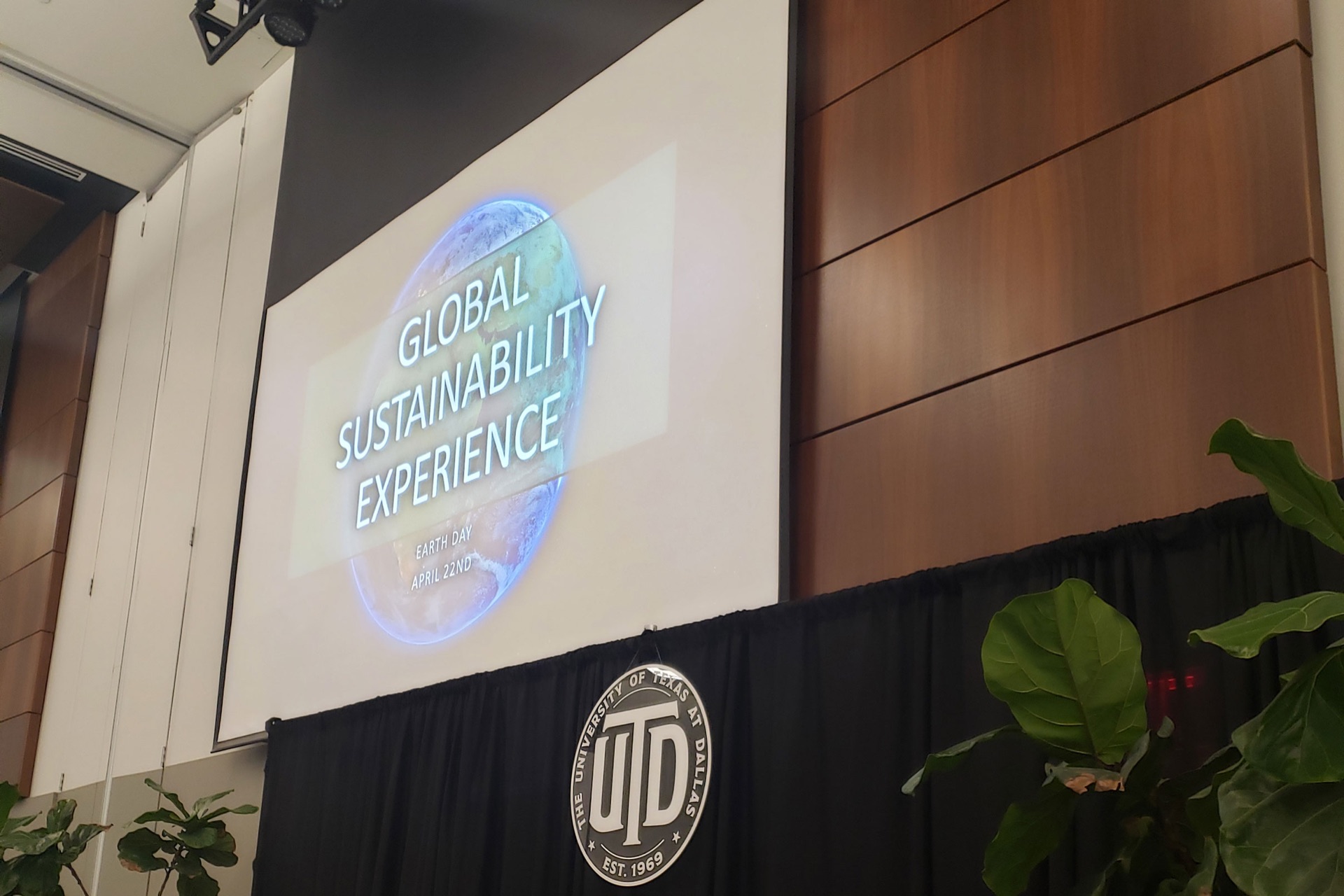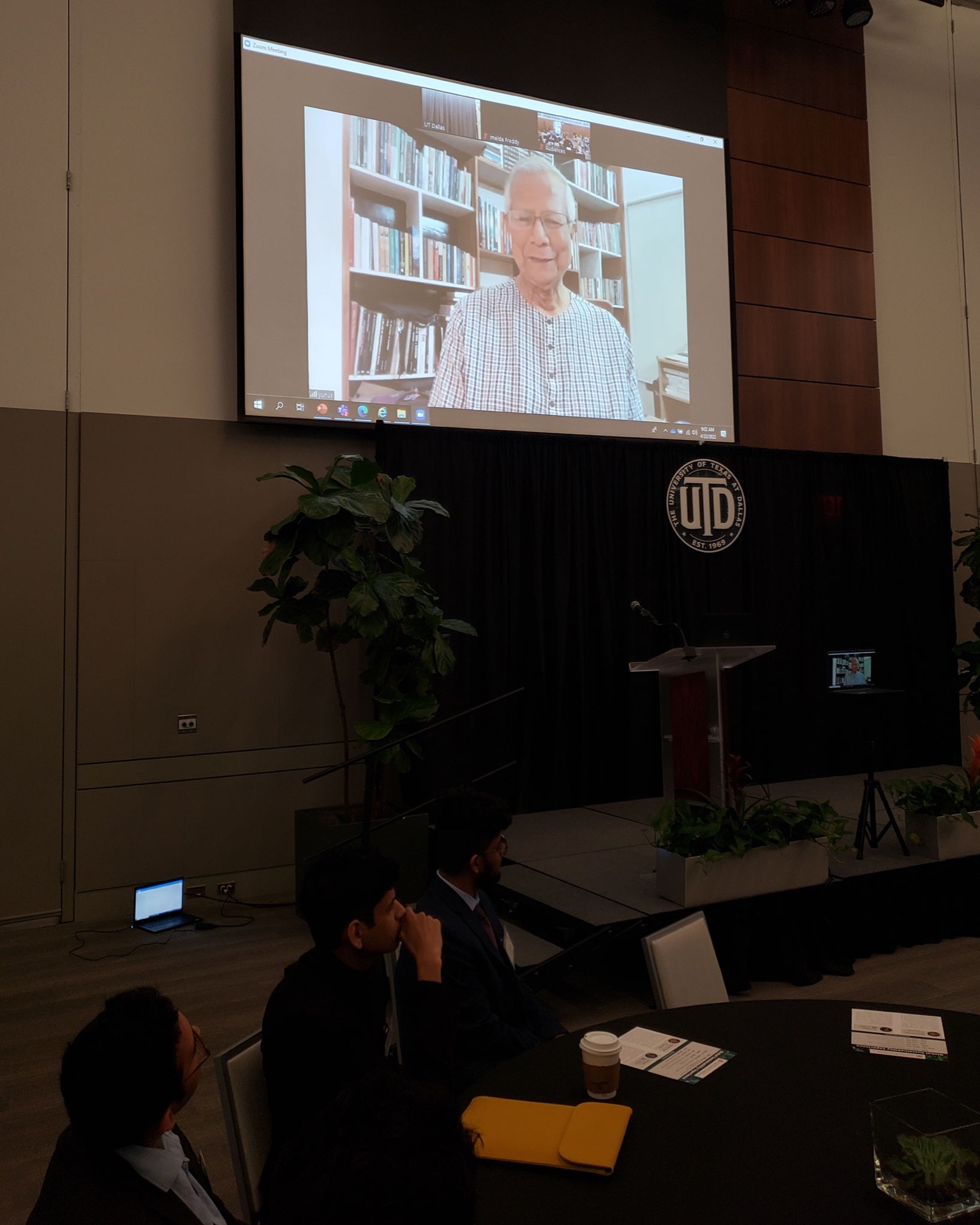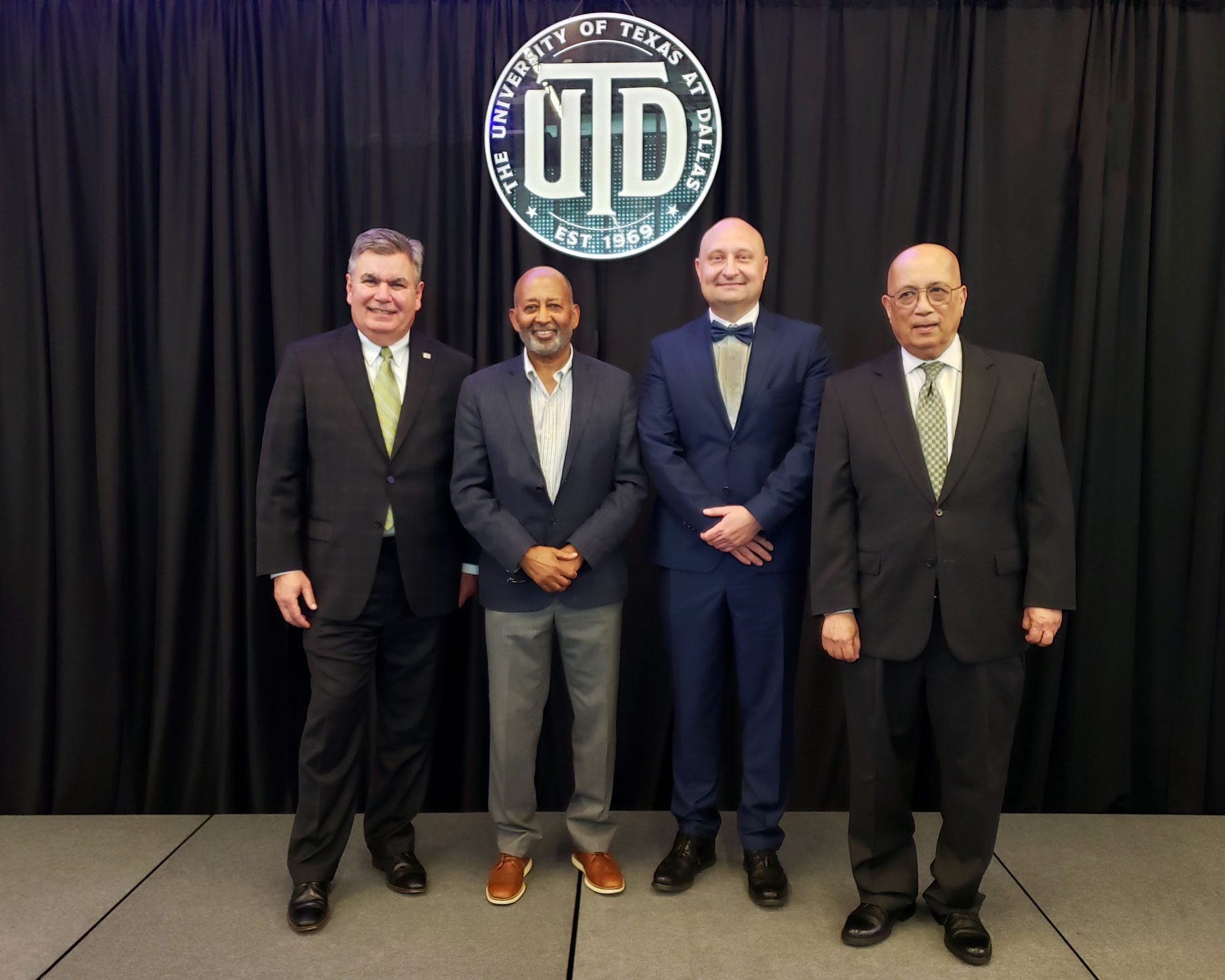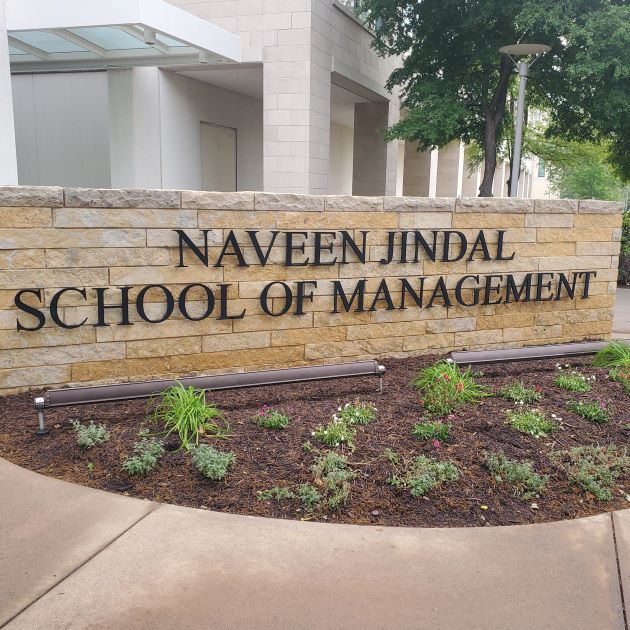
Speakers, Student Competitors Zero In On Sustainability
The inaugural Global Sustainability Experience at the Naveen Jindal School of Management — a semester long event that included two webinars, two workshops and a student pitch competition — concluded with a celebration on April 22 that coincided with Earth Day.
Dr. Hasan Pirkul, Caruth Chair and Jindal School dean, introduced Dr. Muhammad Yunus, the morning keynote speaker. Before the introduction, Pirkul spoke about the role that business schools play in society, especially regarding sustainability.
“Sustainability is absolutely the most important issue that’s facing us in in every school, but particularly in business schools because businesspeople are the leaders,” he said. “We often are blamed for every ill in the society … We are often the leaders of our communities, and we have outsized influence … It’s important that the students coming out of a business school and the future business leaders are far more careful than previous generations with their environment and with sustainability.”

Yunus was a joint winner of the 2006 Nobel Peace Prize for founding the Grameen Bank and pioneering the concepts of microcredit and microfinance, which involve loaning small amounts of money to impoverished borrowers who lack collateral. He joined the audience from his home in Bangladesh via a remote video connection. During his presentation — “Building a New Civilization: Time is Now” — Yunus related how his idea had been met with opposition almost from its inception.
“In the process I got a lot of controversy created through the conventional banks,” he said. “They said ‘It’s a silly thing. You’re doing something which is impossible to do.’ I said ‘Well, if it’s impossible, you don’t have to tell me — it will stop anyway. But I think I’ll continue as long as it works.’ But it always worked so I continued [for it] to become a nationwide bank.”
Yunus said he is often asked about the best way to help people get out of poverty. His reply to those inquiries is that the root cause of the problem is the system does not open the door for the poor. It is built on the wrong premises and so it must be redesigned.
“We have to create a world which is absolutely the opposite of the present world,” he said. “I talk about creating a World of Three Zeros — zero net carbon emission, zero wealth concentration and zero unemployment. I said that three-zero world is possible provided we redesign the system of businesses and entrepreneurship and … technology and so on and so forth to move it in that direction.”
Richardson Mayor Paul Voelker, during his presentation — “A City’s Economic Development Strategies Impact on Sustainability” — described how after the city had partnered with UT Dallas on a $450 million bid for Amazon’s second headquarters, he and the city council realized that not having the winning bid was an opportunity in disguise.
“Maybe instead of giving $450 million to one company, why don’t we spend $40 or $50 million on 400 Amazons?” he said.

Based on that idea, the city started the Richardson Innovation Quarter in partnership with UT Dallas to become a hub for early-stage companies that could one day become equals to Amazon’s accomplishments. Five of UT Dallas’ research are currently housed in the Richardson IQ.
“Develop that technology,” he said. “Start that business, grow that business and I hope you stay here and become Amazon … We literally turned our economic development strategy upside down. I no longer hunt whales. I hunt pilot fish. Because you are going to be the research and development, the innovation, the creativity and the thought leadership of the future. The whales will come to you. So that’s our economic development strategy. It’s turning it upside down and the University of Texas at Dallas is helping us leverage that turn.”
Two JSOM MBA students — Vanessa Gambini and Mustafa Malik — emceed the event. After Voelker’s presentation, they and the judges announced the winners of the pitch competition (See sidebar, “Inaugural JSOM Sustainability Case Competition Showcases UN Sustainable Development Goals”).
The event sponsors were Infosys, GLOMO, SageGlass, The City of Richardson, Yunus Centre, Tech Mahindra and the Ann and Jack Graves Charitable Foundation.
The event was organized by the Sustainable Global Business Initiative, the Center for Global Business, the Center for Information Technology and Management, the Consulting Leadership & Development Society and the Society of Sustainable Business.
Dr. Habte Woldu, director of the Sustainable Global Business Initiative at the Jindal School, closed the event by saying that celebrating the event on Earth Day helps the audience join a worldwide celebration and be a part of that Global arena.
“The Global Sustainability Competition Experience is unique in its nature,” he said. “The process of engaging in sustainable projects requires a broad knowledge of social capital and entrepreneurship, developing critical thinking and solving complex problems and thinking in terms of the rational allocation of resources.
“My challenge to you — to all of us — is to think how you are thinking about sustainability as we walk, as we talk, and act either here at school or the corporate level,” he said. “Throughout your life you have a commitment. Today’s competition was not about prize money, goody bags or the thrill that comes from competition. This was about empowering our students to advocate for sustainability as they pursue their careers and be enactors of change that inspires and encourages their peers to work towards a sustainable future. Students, you are the future. Be the future you want to see.”

Inaugural JSOM Sustainability Case Competition Showcases UN Sustainable Development Goals
The competition featured 32 teams consisting of 132 UT Dallas students, mostly from the Jindal School. The ideas centered around the United Nations’ 17 Sustainable Development Goals. Five teams were selected as finalists. These teams delivered their pitches at the celebration in front of six judges. Three teams were selected for three cash awards totaling $8,000.
The winning team — Biostica — consisted of Parth Hetal Parikh, Yash Shah and Atul Meleth, three supply chain management graduate students. Their idea took first place and $4,000 in prize money for their idea for a packaging company that would provide products that are not only biodegradable but also compostable to food vendors on the UT Dallas campus. They received a trophy that — to be sustainable — will only be on loan to them for a year and then be handed off to the following year’s winners, much like the National Hockey League does with the Stanley Cup. The judges were Carolyn Carlson, head of traditional enterprise sales at Google Cloud’s South-Central region; Gary Cocke, sustainability director at UT Dallas; Ben Cross, CEO of GLOMO; Tan Moorthy, executive vice president, head of U.S. delivery operations and global head of education, training and assessments at Infosys; and Mike Redeker, MBA’97, MS’01, administrator of the Ann and Jack Graves Charitable Foundation.
The winners and finalists were:
First Place
Team Name: Biostica
Prize Amount: $4,000
Business Idea: A packaging manufacturer that eliminates the use of single-use plastic through sustainable, compostable alternatives.
Team Members: Parth Hetal Parikh, Yash Shah, Atul Meleth (all three are supply chain management graduate students)
Second Place
Team Name: Agriscape LLP
Prize Amount: $2,500
Business Idea: A service company that provides urban Indians an opportunity to experience authentic rural life by providing them with farm lodging, activities, and food inspired by the local region.
Team Members: Ishwari Milind Gondkar (finance graduate student), Parth Kulkarni (marketing graduate student), Smita Singh (finance graduate student), Krishna Bezawada (finance graduate student), Mahesh Jajoo (marketing graduate student)
Third Place
Team Name: Slate Haircare & Hygiene
Prize Amount: $1,500
Business Idea: A consumer goods company that provides a filling station at UT Dallas for students to refill bottles of personal care products that do not contain harmful chemicals.
Team Members: Navya Gaddam (business administration junior), Hunter Chan (supply chain management senior), Kevin Jose (information technology and systems sophomore), Niyati Palasamudram (supply chain management senior)
Other Finalists
Team name: The Green Machine
Business Idea: A mobile market that provides healthy, locally sourced groceries to food deserts, focusing on South Dallas food deserts.
Team Members: McKenna Potter (global business senior), Joseph Smrstik (political science senior), Jack Land (finance senior), Cari Reinert (international political economy senior), Tanya Kalra (finance graduate student)
Team name: reCycle Box
Business Idea: A textile repurposing business that contributes to the creation of circular fashion by reusing, recycling, or remaking old clothing into new products.
Team Members: Harshitha Pasala (information technology and management graduate student), Lisha Peswani (information technology and management graduate student), Lauren Bernal (MBA student)





